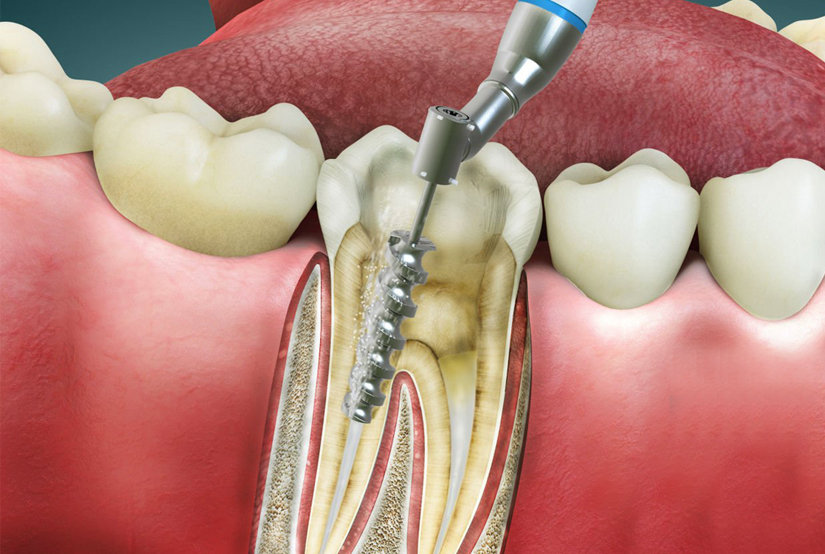Root Canal Therapy in South Barrington, IL
Root canal therapy at South Barrington Dental Care is a dental procedure performed to remove infected or inflamed pulp tissue from within the tooth, clean and disinfect the root canals, and then seal them to prevent further infection.
The pulp, located in the center of the tooth, contains nerves, blood vessels, and connective tissue. When it becomes infected or damaged due to deep decay, cracks, or trauma, bacteria can multiply within the pulp chamber, leading to pain, swelling, and potentially abscess formation. Root canal therapy addresses this by removing the pulp, alleviating pain and swelling.

Signs and Symptoms Requiring Root Canal Therapy
Signs and symptoms that may indicate the need for root canal therapy include:
- Persistent tooth pain: Severe and persistent pain in a specific tooth, especially when chewing or applying pressure, can be a sign of nerve damage or infection deep within the tooth.
- Sensitivity to temperature: Increased sensitivity to hot or cold foods and beverages, which lingers even after the stimuli are removed, may indicate nerve irritation or inflammation.
- Gum swelling and tenderness: Swollen and tender gums around a tooth, often accompanied by a pimple-like bump on the gums (abscess), can indicate an infection spreading from the tooth's root.
- Tooth discoloration: Darkening of the tooth, particularly if it's sudden and unexplained, may signal that the nerve inside the tooth is no longer viable and requires treatment.
- Deep decay or damage: A deep cavity or extensive dental trauma, such as a crack or fracture in the tooth, can expose the nerve to bacteria, leading to infection and inflammation.
- Prolonged sensitivity to pressure: Sensitivity to biting or pressure on a tooth that lasts longer than usual can indicate that the nerve and surrounding tissues are compromised.
- Loose tooth: A tooth that feels loose or unstable, unrelated to injury or orthodontic treatment, may be experiencing internal damage to its supporting structures.
- Previous dental procedures: Teeth that have undergone multiple dental procedures or trauma may eventually require root canal therapy if the nerve becomes damaged or infected.
If you experience any of these symptoms, it's essential to consult with a dentist, such as Dr. Tayyabba Athar at South Barrington Dental Care, promptly to have your condition properly diagnosed and an appropriate treatment plan developed. Early intervention can help prevent further complications and preserve your natural tooth structure. Contact us to learn more.
The Root Canal Procedure Explained
Initial Examination and Diagnosis
Dr. Tayyabba Athar will begin by examining the tooth and taking X-rays to assess the extent of damage and determine if root canal therapy is necessary. Based on the diagnosis, she will discuss the procedure in detail and address any concerns you may have.
Anesthesia
Local anesthesia is administered to ensure your comfort throughout the procedure. Sedation options may also be available for patients with dental anxiety or more complex cases.
Accessing the Pulp
A small opening is created in the crown of the tooth to access the infected or inflamed pulp chamber and root canals.
Removing Infected Tissue
Using specialized instruments, Dr. Tayyabba Athar carefully removes the diseased pulp, debris, and bacteria from the tooth's interior. The root canals are then cleaned, shaped, and irrigated to remove any remaining infection.
Filling and Sealing
Once cleaned, the root canals are filled with a biocompatible material called gutta-percha to seal them off and prevent future infection. The access opening in the tooth is sealed with a temporary or permanent filling.
Restoration
Depending on the extent of damage to the tooth's structure, a dental crown or filling may be recommended to restore its strength, function, and appearance. Dr. Tayyabba Athar will discuss the best restoration option for your specific case.
Post-Procedure Care and Recovery
After root canal therapy, it is normal to experience some mild discomfort or sensitivity, which can usually be managed with over-the-counter pain medications and following any specific care instructions provided by Dr. Tayyabba Athar. It's important to maintain good oral hygiene practices, including brushing, flossing, and regular dental visits, to ensure the treated tooth remains healthy and functional for years to come.
Benefits of Root Canal Therapy
Root canal therapy offers several benefits, including:
- Pain relief: Eliminates severe toothache caused by infected or inflamed pulp.
- Preservation of the natural tooth: Saves the natural tooth from extraction, maintaining chewing efficiency and facial aesthetics.
- Prevents infection spread: Stops the spread of infection to neighboring teeth and surrounding tissues.
- Cost-effective: Typically more cost-effective than tooth extraction with its accompanying replacement options like dental implants or bridges.
Conclusion
At South Barrington Dental Care, Dr. Tayyabba Athar and her dedicated team are committed to providing exceptional root canal therapy tailored to meet your individual needs. With state-of-the-art facilities and a patient-centered approach, we ensure a comfortable and positive dental experience for every patient. Contact us today to schedule your consultation and take the first step towards restoring your oral health with expert root canal therapy.
Experience exceptional dental care at South Barrington Dental Care with Dr. Tayyabba Athar. Call (847) 382-0700 today to schedule your appointment and discover a healthier, brighter smile at 8 Executive Court, Suite #2, South Barrington, IL 60010.
Dental Crowns
Dental Implants
Teeth Whitening
Invisalign® Clear Aligners
Cosmetic Dentistry
Dentures and Partials
Dental Implant Restorations
Dental Fillings
Dental Bridges
All-on-4® Implants
Tooth Extractions
OralID® Cancer Screening
Emergency Dentist
Digital X-rays
Dental Cleanings and Exams
Dental Veneers
Restorative Dentistry
General Dentistry
Visit Our Office
Office Hours
- MON8:00 am - 6:00 pm
- TUE8:00 am - 7:00 pm
- WED9:00 am - 5:00 pm
- THU8:00 am - 4:00 pm
- FRIClosed
- SATBy appointments only
- SUNClosed
